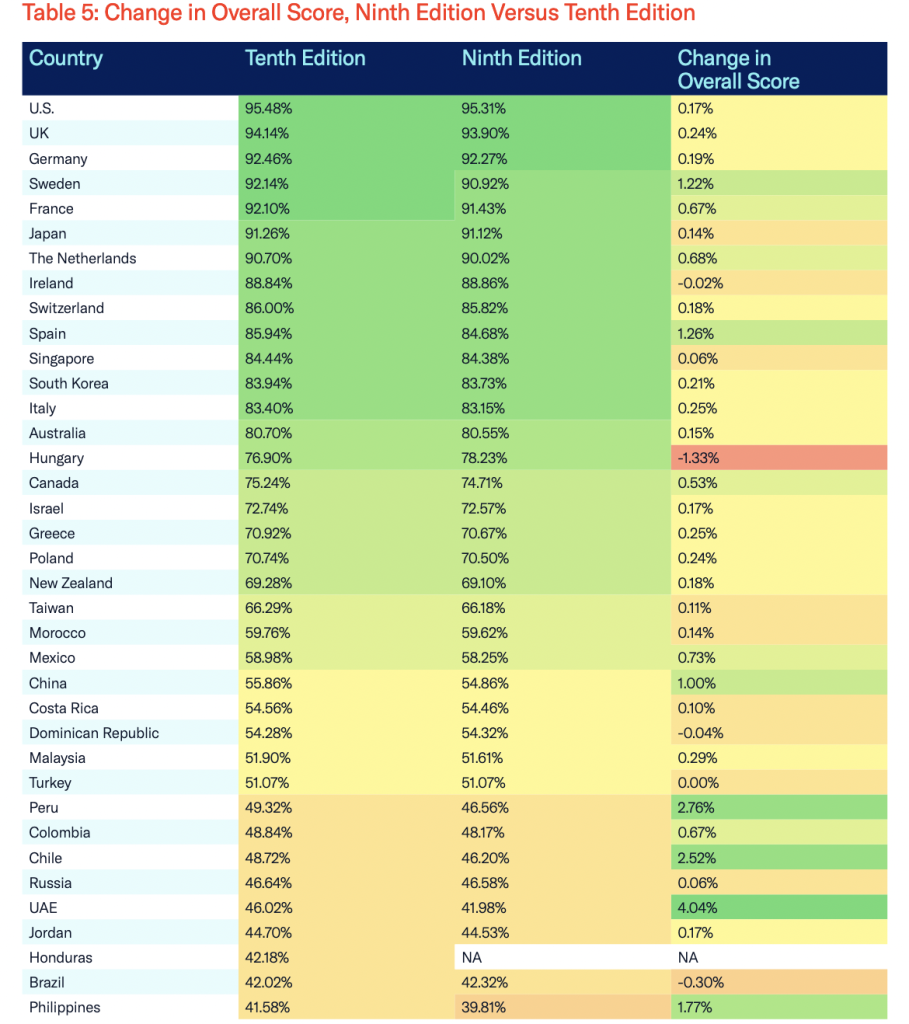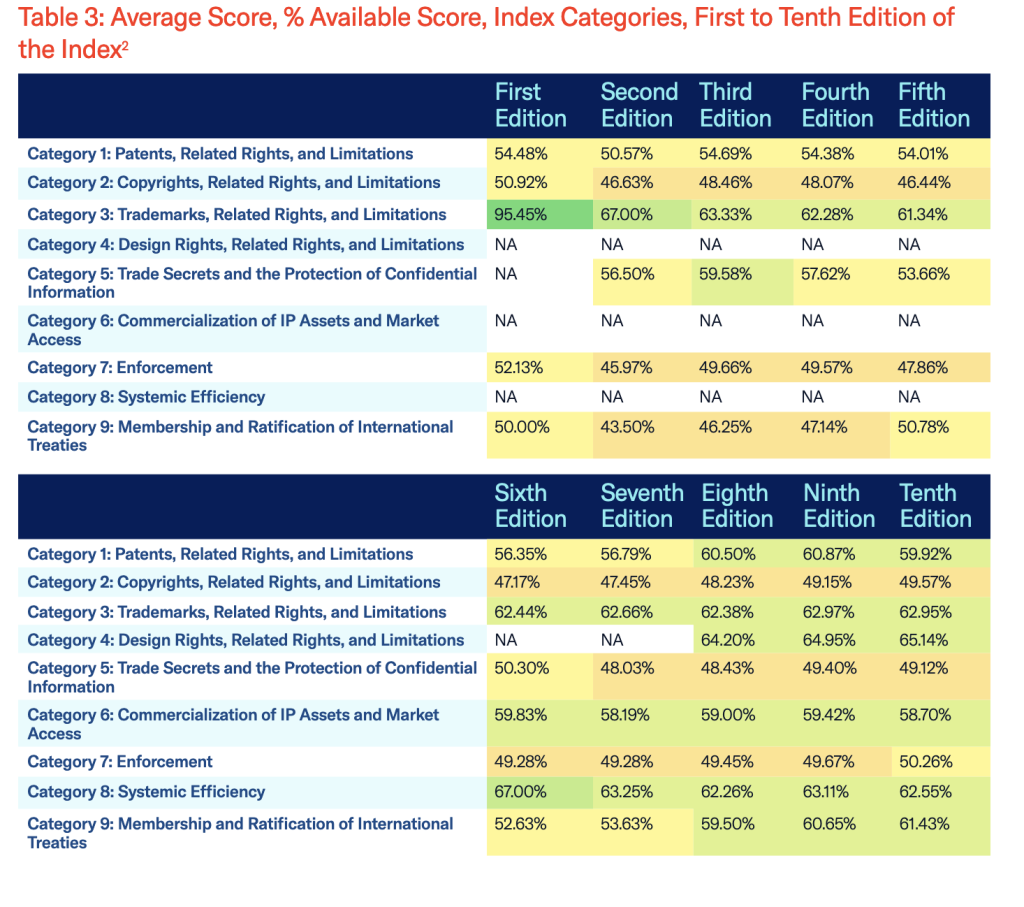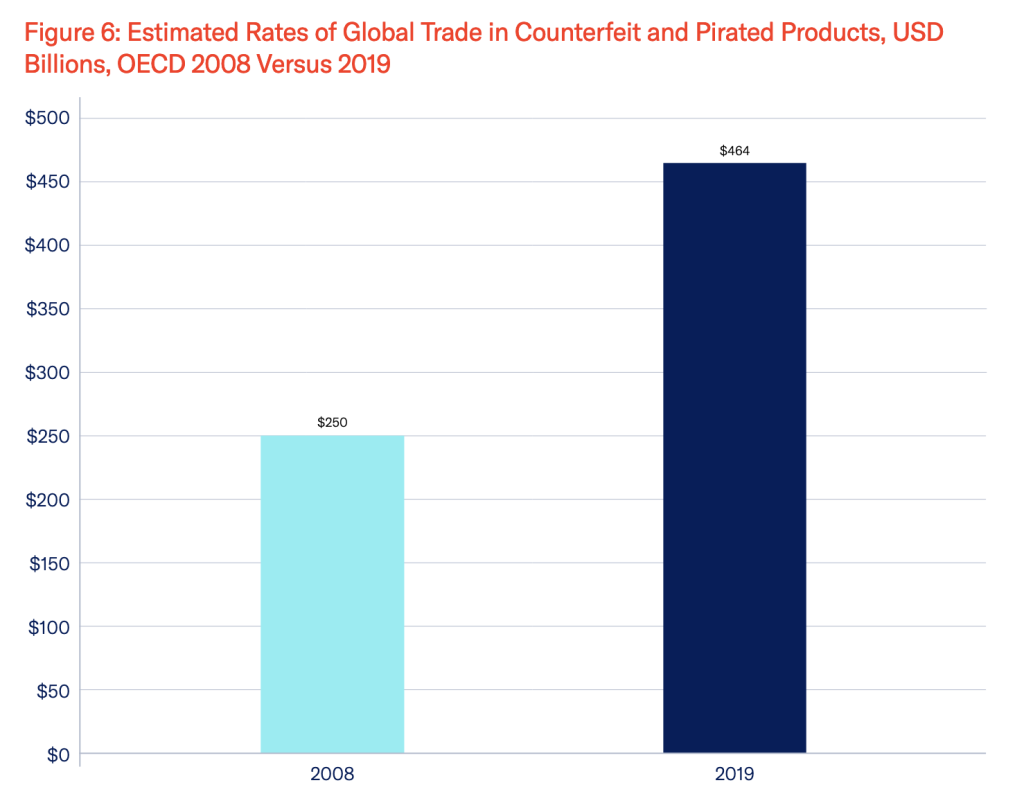“A considerable portion of the Patents section is devoted to detailing the current patent environment in the United States, which the 2022 International IP Index says continues to hold the country back.”
The U.S. Chamber of Commerce’s Global Innovation Policy Center (GIPC) today revealed its 2022 International IP Index, “Compete for Tomorrow,” which is now in its tenth edition. Last year, the report focused on the role of effective intellectual property (IP) frameworks in helping economies to combat and recover from the COVID-19 pandemic and identified several emerging economies that had made significant improvements. This year, the report analyzes ten years of data, which reveals that the global IP environment has steadily improved overall, including in the last two years of turmoil, and that emerging economies are particularly making a conscious decision to bolster their IP regimes.

Highs and Lows
The United States once again remains in the top spot, with an overall score on the Index of 95.48%. The UK (94.14%), Germany (92.46%), Sweden (92.14%) and France (92.10%) are in spots 2-5. The Index covers 55 global economies, with Ghana and Honduras just added for the 2022 report.
Since the first edition of the IP Index, which only included 11 economies and 25 indicators, the average score of economies has increased by 1.50%—from 55.72% in 2012 to 57.22% in 2022, with the biggest improvements seen in the patents and international treaties categories.
 The report noted a particular improvement in the realm of piracy, with new injunctive-style relief tools playing a big role. “For example, in Sweden, survey results show that the number of respondents accessing copyright-infringing content fell from 21% to 14% following the use of these new enforcement tools,” said the report’s Executive Summary.
The report noted a particular improvement in the realm of piracy, with new injunctive-style relief tools playing a big role. “For example, in Sweden, survey results show that the number of respondents accessing copyright-infringing content fell from 21% to 14% following the use of these new enforcement tools,” said the report’s Executive Summary.
In the category of patents, 31 economies achieved a score of 50% or more; in copyrights, the majority of economies achieved a score below 50%; while only 10 of the 55 economies failed to score 50% or more in trademarks. The dismal copyright scores have to do with most economies’ inability to protect copyrighted content online.
The weakest average score on the Index, however, was in the area of trade secrets, due to the total absence of protection for such rights in most economies. The average score across all economies was 49.12%.
Of the 55 economies surveyed, 45 improved their overall scores this year.
The Patents and Related Rights category saw top three scores identical to last year, with Singapore in the number one spot (97.22%) followed by a tie for second place among Japan, South Korea, Switzerland and the United States (94.44%). Tied for third place are eight countries: France, Germany, Ireland, the Netherlands, Spain, Sweden, Taiwan and the UK (91.67%). Italy comes in fourth (88.89%) followed by Australia and Israel in fifth (83.33%). Last year, Hungary beat out Australia and Israel for fifth place, but this year the country saw an overall decrease of 1.33% in this category.
Nigeria and Ghana both acceded to the International Convention for the Protection of New Varieties of Plants (UPOV), Act of 1991, boosting those countries in this category, and helping to increase Nigeria’s score by 3.91% overall compared with last year’s report. In patents, Nigeria’s score soared from 22.22% last year to 33.33% this year.
Don’t Get Complacent
Despite the high U.S. scores, the report noted a continuing “degree of uncertainty” with respect to patent eligibility and Patent Trial and Appeal Board (PTAB) proceedings in the United States. A considerable portion of the Patents section is devoted to detailing the current patent environment in the United States, which the Index says continues to hold the country back. On this point, the report concludes:
The net result is that, at a systemic level, rightsholders are left without a clear sense of how decisions on patent eligibility will be made and, when granted patents are subsequently challenged or reviewed either through the courts or through the inter partes proceedings within the USPTO, which patent claims will be upheld.
The Index also explained that the indicators it uses represent the “gold standard” for the protection and enforcement of IP rights and noted that the global average score remains less than 60%, “illustrating there is still significant room to improve the framework for innovation and creativity in global markets.”
Another area of concern is in the area of enforcement against physical IP-infringing goods. The report says that its Indicator 37: Effective Border Measures, “measures the extent to which customs authorities, border guards, and/ or other designated officials have the ex officio authority to seize suspected counterfeit and pirated goods, including goods in-transit, without a formal complaint from a given rightsholder.” However, there hasn’t been much headway made in this regard:
 Unfortunately, few economies have these powers in place and thus deprive rightsholders (and consumers in these jurisdictions) an effective avenue for enforcing IP rights at the border and eliminating the health and safety risks of counterfeit and pirated goods. In many Index economies, customs officials are not given ex officio powers to seize suspected goods. In some cases in which they do have this power, in practice they do not use it or the power is restricted to only goods that are destined for the domestic market and not those in-transit.
Unfortunately, few economies have these powers in place and thus deprive rightsholders (and consumers in these jurisdictions) an effective avenue for enforcing IP rights at the border and eliminating the health and safety risks of counterfeit and pirated goods. In many Index economies, customs officials are not given ex officio powers to seize suspected goods. In some cases in which they do have this power, in practice they do not use it or the power is restricted to only goods that are destined for the domestic market and not those in-transit.
The Index also touched on the controversial proposal to the World Trade Organization (WTO) to waive IP rights under the Trade Related Aspects of Intellectual Property Rights (TRIPS) Agreement, calling it a “wrong turn” that “will impede ongoing and successful efforts to license and scale global production of safe and effective COVID-19 therapies and vaccines.”
Read the full report here and the Executive Summary here.

![[IPWatchdog Logo]](https://ipwatchdog.com/wp-content/themes/IPWatchdog%20-%202023/assets/images/temp/logo-small@2x.png)

![[Advertisement]](https://ipwatchdog.com/wp-content/uploads/2024/04/Artificial-Intelligence-2024-REPLAY-sidebar-700x500-corrected.jpg)
![[Advertisement]](https://ipwatchdog.com/wp-content/uploads/2024/04/Patent-Litigation-Masters-2024-sidebar-700x500-1.jpg)

![[Advertisement]](https://ipwatchdog.com/wp-content/uploads/2021/12/WEBINAR-336-x-280-px.png)
![[Advertisement]](https://ipwatchdog.com/wp-content/uploads/2021/12/2021-Patent-Practice-on-Demand-recorded-Feb-2021-336-x-280.jpg)
![[Advertisement]](https://ipwatchdog.com/wp-content/uploads/2021/12/Ad-4-The-Invent-Patent-System™.png)






Join the Discussion
No comments yet.